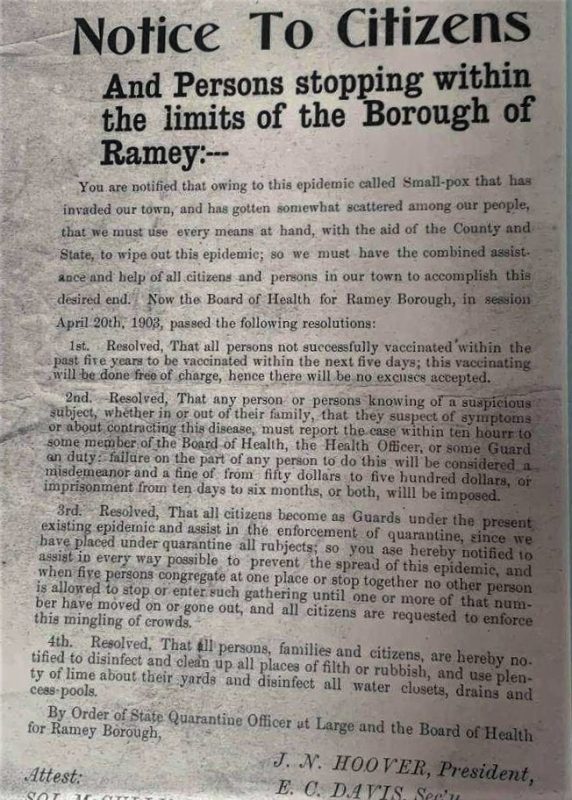Ramey is a small borough that is situated in the midst of Woodward, Bigler and Gulich Townships, in southern Clearfield County.
It was incorporated as a borough in 1888, taking its name from David K. Ramey, an early investor and operator in both the logging and coal businesses.
Both the Altoona and Philipsburg Branch (Alley Popper) of the Pittsburgh and Susquehanna Railroad and the Pennsylvania Railroad converged in Ramey as the deep coal mining industry boomed in the late 19th to mid-20th centuries.
Coal mining brought droves of European immigrants who braved the hazards and low wages of old-time mining. Hotels, stores, four churches and the Pastime Theater all thrived and served Ramey’s residents. The hotels, stores and theater are gone, but the churches, as well as a few businesses remain.
Public sanitation at the beginning of the last century was, in rural areas, poor, to say the least. Ramey was only one of many Clearfield County towns that had dirt (often mud) roads, an easily-compromised water supply, out houses and animal sheds. Run-off from the latter two posed an ever-present health hazard to crowded areas.
Those were also times of deadly epidemics. Typhoid, diphtheria and cholera occasionally spread horrific fever and claimed the lives of children and adults.
The contagions often ran their course to leave behind a trail of death and grief. Hospitals were often distant, many people were poor, doctors were often over wrought and antibiotics simply didn’t exist.
It was almost taken for granted that families would lose babies and toddlers, as well as kids and teens to pneumonia and other diseases that are today usually considered not life-threatening and treatable.
Small pox was an age-old killer that began with red spots, blisters, fatigue and often gave rise to a raging and nearly uncontrollable fever.
Survivors were often left with pock-marked skin for life. There were outbreaks even though the cowpox vaccine, as a preventive measure, had been developed as early as the 1700’s.
The handbill shown is blunt and to the point. Ramey, in 1903, was hit with a smallpox outbreak and its borough council took immediate action.
Solomon McCully, council president, approved the mandate. All persons were mandated to comply with quarantining.
Vaccinations would be offered free of charge. Families had ten hours to report sick members of their household. Failure to report infected people would result in fines or jail time.
Furthermore, “all places of filth and rubbish” were to be cleaned, lime was to be spread and outhouses were to be disinfected. Gatherings were limited to five persons.
There are shades of the 1918 Spanish Flu and the 2020-21 COVID-19 pandemic in the handbill.
The United States was a much more disciplined society in 1903. Epidemics and resulting death were nowhere near as remote as today.
People weren’t inclined to complain about having to stay distant from each other. Wintertime mask wearing was a common means of preventing colds and flu. Saving lives mattered.
And, as the handbill sharply indicated, quarantine meant quarantine.
